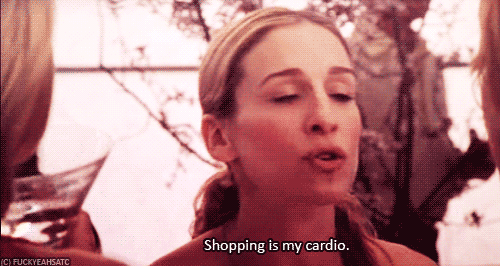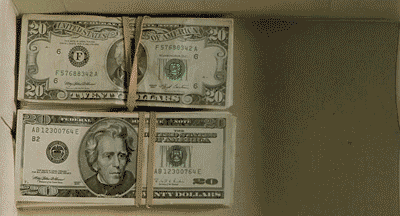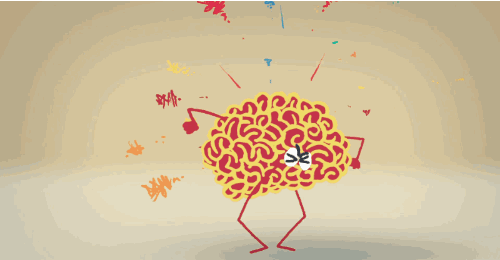Psychology Talk Series # 11: Your Brain and Your Impulsive Shopping

I remember, a few weeks ago, I saw a really fabulous fur coat with this leopard print I knew was my style. Yes, I love those fauna prints and the vibe of a good ol' garment that represents elegance and wealth. I knew I did not need it and that I did not even have any intense desire to buy it, for I live in a tropical country and I don't even have functions to attend where that may be an appropriate outfit. Buying it would merely mean hoarding, but staring at it with fascination, I realized that if I were 15 with the same load of cash I have now, I would have non-hesitantly purchased the coat and with just a mere glance on its size--yes no price check.
Now, I am not really here to just discuss how I mastered the rejection of such temptation to buy unnecessary materials but to rather educate you on how we tend to have those impulsive shopping decisions so that you could come up with your own technique.
The Tricks Exposed

Obviously, it is not just our brains that have the sole responsibility to our tendency to impulse-shop. There is a whole world of advertising and marketing strategies out there to which our brains respond to. I mean we can't deny how those 50% off and Buy 1 Take 1's have swept us into those stores a few or even several times. Top it off with the "Avail Promo Before It Ends Soon!" in bright red font plastered on the entire glass of the stores, and you're really up for a hell of a regret to deal with afterwards.
Now, those marketing strategies have always succeeded in getting us into taking out our cash and cards because as humans, we are naturally built to feeling different things that manifest even in our general and daily interactions that somehow play big roles in our shopping habits.
You see, ironically, our desire to save things may it be memories down to cash could drive us really crazy. When we want to save money and see those promos all over the stores we pass by, we are more inclined to think "Oh, that's a good deal!" rather than "Oh I don't really need that, do I?" This is because we tend to focus our mindsets on the concept of saving through bargains rather than actually just saving--doing nothing at all. We are people--we like moving along, thus we go with the temptation of a so-called bargain that is actually just the real and only reasonable way companies should sell their products to you. Now, that's a capitalist thing, so let's just go back to our agenda.
Then Check Your Issues

It does sound irresponsible, but try looking past it and assess the whole side of impulsive shopping in that therapy sense. See, we humans have a thing for collection. Most of us are hoarders that the minimalist movement still seems to be a minority in this society. We like acquiring more and more materials, for such collection gives off a feeling that we are happy or we are supposed to be happy because we have a bunch of possessions. It's a classic and problematic mindset, really.

However, if that collection issue were really the case, how come people just don't collect cash instead of what it could buy? Made you think? That should start your process in finding your technique to overcome this tempting shopping issue.
Now, Let's Get Inside the Brain

Just like in that gif, your brain definitely goes crazy when you are tempted by an attractive thing on the store shelf or online shop selection. The following are parts of the brain that are involved in this madness:
Nucleus Accumbens
This part of the brain activates for primary reward drives such as sex and food (damn, two best things in the world indeed, eh?). It is also the same part of the brain that activates how thrilled you will be to own that product you have been wanting to buy.
Insula
It is the part of the brain that is activated when we are in a verge of being attacked or when we smell unpleasant odor. In your shopping cases, this is the part of the brain that reacts to the price of the product--the higher the price, the stronger its activation.
Mesial Prefrontal Cortex
It is the part of the brain that activates or reacts to the price of a perceived good deal.
Conclusion
.gif)
It is our choices that influence these activities. These activities are not the cause of our choices but rather the skeleton of them. Now, what you have to do is to make sure to keep in mind that those factors those brain parts activate for are to be watched. Therefore, you must always focus on the following:
- Look at the rationality of buying the product rather than the temporary excitement it could give you.
- Always calculate the practicality of the price of the product you want to purchase with the amount of money you have with you.
- Have a wise classification of what a good deal really is, and again, with relation to your financial status.

references:
- Psychology Today
- My Psychology Class Notes
@thegiamarcos I am going to print this post and put it up on my wall as a healthy reminder :D
Aww I hope you include my fabulous picture though! 😅😅
Kidding aside, it's flattering that you find my article as a healthy reminder. Very grateful, and I hope my next posts interest and help you as well! 😊😊
I was never told this even in the University. Nice article am saving this great information here
Thank you!
They teach you what you don't need to know really @gimba! The education system is horrible nowadays!
I like ur Post, great view
Thanks!
Since you make quite a few posts about #psychology @thegiamarcos why don't you implement a post about #NLP. Are you familiar with that?
ooh NLP, what is it?
#NLP
Neuro-Linguistics Programming
It's a form of communication dealing with the brain. I use NLP on people sometimes to put them onto #Steemit.
Oh yeah I see. Not really into that exactly
Which part aren't you into @thegiamarcos? The #communicating part?
NLP in general
...but you're dealing with #psychology in a lot of ways with #NLP. What don't you like about NLP @thegiamarcos? You can use it to help out in your life with #personaldevelopment for example.
I use it sometimes I think, but I was referring to how it's more of a one-on-one thing, cuz you gotta make sure the person you're reaching out to with your nlp is the one who exactly needs it, and steemit is for a broader one.
I do not like marketing strategies for the holidays :)))
Haha same
When it comes to marketing what kind of strategies do you like @thegiamarcos?
Haha I'm very practical and thrifty, thus I always check the price and calculate if it's worth it and if my wallet can handle it. If the answer is yes, I turn my back on it, walk around again, ask myself if I really need that thing, and if I get cold feet in buying it (a usual), then it's a no ahaha.
woow
good man😍
Thanks
i love this, thanks for sharing this and telling us how the brain works, i would love to know more on this, you've given me a great task which i must accomplish..thanks once again for sharing this
Oh, you're very welcome :) Follow for more of these!
Well written article! But I have something to add to your final conclusions:
Before buying something expensive, I usually give myself some time to think again and make sure that I've thought about it for at least 2-3 days of having slept enough.
For example, on some days, you might feel overconfident about your finances and have a distorted view of a good deal. But you're less likely to be illusioned over a course of 2-3 days. And for more expensive items, perhaps one could take some more time to think again.
Thank you, you have a new follower! I'm a new steemiter and share articles on philosophy, effects of technology on society, and ethics, and it would be great if you consider following me by taking a look at my previous posts! :)
Oh, that's a wise way of analyzing a potential purchase. It's true though, there are really those days you feel over confident about your finances and just leave out room for other possibilities or circumstances..
Oh, following you now. Expecting to see more posts about the said topics! Greatly interested in those! :)
Whenever we see the words sale, discount, price reduction and buy one take one our minds go into overdrive thinking how much we will be saving and getting more bang for our buck but unbeknownst to us sellers are trying to get rid of stocks.
Those signs and ads make us feel that we are putting one over the seller and getting a better deal yet we are chumps for believing it.
A large part of the addictions to sales and impulsive buying is the dopamine associated with the satisfaction of getting something on sale.
Whenever I am hit with an impulse to buy something I consider do I need it or was I led to want it because of all the subliminal symbols and tone to buy it.
Great post as you continue to enrich Steemit.
Yeah, we always have to be wise in things. This whole shopping thing can even serve as an analogy to how people look at the "free finest things in life"--they indulge in it like crazy without looking at how it lures them into yet another hole of inevitable downfall. They forget to look at the underlying problems that may arise and continue to doing things they think are the good deal when in fact it leads them exactly there into that awful case they even forgot as a big possibility
Great!
Thanks!